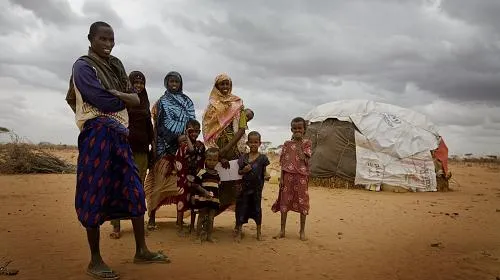CARE scales up response, urges donors to ease restrictions on aid delivery
NAIROBI (July 20, 2011) – Today, famine was officially declared in two regions of southern Somalia – the first time a major famine has been announced since the famine in the Somali region of Ethiopia in 2000. This morning’s declaration of famine confirms that the Horn of Africa emergency is the worst humanitarian crisis in the world now. The United Nations is warning that if the international community does not act now, famine will spread to all areas of southern Somalia within two months.
Across Somalia, more than 3.7 million people – more than half the entire population – are in desperate need of humanitarian assistance. In some areas in the south, nearly half the population is malnourished. These areas have the highest malnutrition rates in the world. Across the three worst-affected countries of Somalia, Ethiopia and Kenya, more than 11 million people need immediate food assistance.
To respond to the growing humanitarian crisis, CARE is calling for:
- International donors to commit funds to this emergency immediately to provide lifesaving aid to people affected by the famine and food crisis. The current humanitarian response is inadequate due to lack of funding and of access; just half of funds needed have been committed so far.
- All parties in south-central Somalia to grant uninhibited and unconditional access to humanitarian agencies.
- International donors to ease the current legal restrictions on the delivery of aid in Somalia on humanitarian grounds to enable more aid to reach those who need it.
“The declaration of famine is an urgent plea for these people. It is the most critical thing I’ve seen in 22 years of field experience. Every man, woman and child is suffering. The conditions of these people as they cross over the border from Somalia into the Dadaab refugee camps is down to the bone,” said Barbara Jackson, CARE International’s humanitarian director, who is in the Dadaab refugee camp this week. “The level of suffering they have endured is beyond our imagination, and they require immediate assistance. Everyone I met had the same message: ‘Please tell the world for us, that we need help, and that we need it now. We cannot last much longer’.”
CARE has already reached more than 1 million people across Somalia, Ethiopia and Kenya with humanitarian assistance, and we doubled our initial emergency appeal to scale up our response to provide food, water and emergency supplies to a total of 2 million people affected by the emergency in the three countries:
- In Somalia, CARE has assisted 164,000 people with drought relief activities and cash interventions to help families buy food, and we are scaling up our response to help as many people as possible.
- Across the border in Kenya at the Dadaab refugee camps, where more than 61,000 Somalis have sought safe haven in the past six months, CARE is the primary distributor of food, water and primary education for the 380,000 refugees currently living there, most of them Somalis. More than 1,500 people are arriving each day, and CARE is working with partners to scale up our response. CARE will provide food, water and emergency assistance in the newly-opened Ifo II camp, which will provide safe shelter to an additional 40,000 refugees. CARE also is responding to the drought in northeastern Kenya.
- In Ethiopia, CARE has helped 241,587 people with food and nutrition assistance, nutrition, water and sanitation interventions such as water point rehabilitation, distribution of water treatment chemicals and hygiene promotion as well as livestock intervention comprising of slaughter destocking, animal feed and support to zonal animal health authorities.
Media Contacts:
Atlanta: Nicole Harris, CARE, nharris@care.org, 1.404.979.9503, 1.404.735.0871 (mobile)
For Somalia (in Nairobi): Melanie Brooks, CARE, brooks@careinternational.org,
+41.79.590.3047 (mobile)
Ethiopia: Sandra Bulling, CARE, bulling@careinternational.org, +251.923.07.84.35 (mobile), +41.79.205.69519 (mobile)
Dadaab Refugee Camps: Alexandra Lopoukhine, CARE, Alexandra.Lopoukhine@care.ca, +254.729.939032 (mobile)
Nairobi: Juliett Otieno, CARE, jotieno@care.or.ke, +254.721.428978, +254.20.2710069 (mobile)

